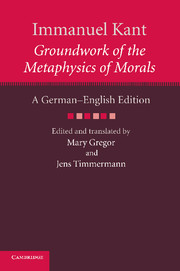Book contents
- Frontmatter
- Contents
- Acknowledgements
- Introductory note: text and translation
- Kant: Groundwork of the Metaphysics of Morals
- Vorrede / Preface
- Erster Abschnitt / First Section
- Zweyter Abschnitt / Second Section
- Dritter Abschnitt / Third Section
- Editorial notes
- Index of names
- Index of words
- Index of key terms
Dritter Abschnitt / Third Section
Published online by Cambridge University Press: 05 June 2012
- Frontmatter
- Contents
- Acknowledgements
- Introductory note: text and translation
- Kant: Groundwork of the Metaphysics of Morals
- Vorrede / Preface
- Erster Abschnitt / First Section
- Zweyter Abschnitt / Second Section
- Dritter Abschnitt / Third Section
- Editorial notes
- Index of names
- Index of words
- Index of key terms
Summary
Transition from the metaphysics of morals to the critique of pure practical reason
The concept of freedom is the key to the explanation of the autonomy of the will
A will is a kind of causality of living beings in so far as they are rational, and freedom would be that property of such a causality, as it can be efficient independently of alien causes determining it; just as natural necessity is the property of the causality of all nonrational beings to be determined to activity by the influence of alien causes.
The explication of freedom stated above is negative and therefore unfruitful for gaining insight into its essence; but there flows from it a positive concept of freedom, which is so much the richer and more fruitful. Since the concept of causality carries with it that of laws according to which, by something that we call a cause, something else, namely the consequence, must be posited: freedom, though it is not a property of the will according to natural laws, is not lawless because of that at all, but must rather be a causality according to immutable laws, but of a special kind; for otherwise a free will would be an absurdity. Natural necessity was a heteronomy of efficient causes; for every effect was possible only according to the law that something else determines the efficient cause to causality; what else, then, can freedom of the will be, but autonomy, i.e. the property of the will of being a law to itself?
- Type
- Chapter
- Information
- Immanuel Kant: Groundwork of the Metaphysics of MoralsA German–English edition, pp. 120 - 156Publisher: Cambridge University PressPrint publication year: 2011



